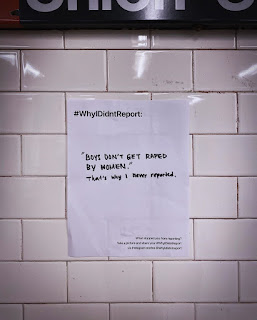What About the Men?
*Trigger Warning: this post discusses sexual assault, rape, rape culture*
 |
| #WhyIDidntReport |
Recently in the news there has been a man who has been called "Britain's most prolific rapist" in legal history. Reynhard Sinaga was convicted of 159 offences against 48 people from 2015-2017. Police estimated that he could have up to 195 victims who he sexually assaulted and/or raped by luring his victims in through good-will, drugging them and taking advantage of their unconscious state. (Halliday, 2020. The Guardian).
What was most interesting to me about this case was that Sinaga's victims were men.
Britain's most prolific rapist targeted men.
Rape culture is something I studied a lot at university and something I've seen first hand during my experiences as an undergrad student. One of the main discussion points for analysing rape culture is how women's experiences have shaped our understanding of how locker-room banter (etc) has created a culture where we normalise, and to some extent encourage, about sexual abuse and rape. But the focus has always been on women.
While sexual abuse and rape against women is a massive issue and the UK criminal justice system needs serious reform on the way it treats survivors, the victimisation of men as rape victims is more taboo.
Men experience sexual assault and rape too. People don't like to talk about that fact, arguably out of fear it will set back women's movements (mainly extreme men-hating feminists...if you can call them that). Or maybe its because society has created this expectation for men to be tough, masculine figures that are only capable of protecting the vulnerable or being aggressors. Well its not true.
Around 12,000 men are raped in the UK per year.
Almost 70,000 men will experience sexual assault per year.
(Survivors UK).
Breaking the stigma around men who experience sexual assault is such an important to challenging the silence that survivors feel they are burdened with. Attitudes towards rape shouldn't be trivial or normalising, we need to be more supportive, as a society, of people's experiences and help create safe spaces where people can feel safe enough to tell their story - men and women.
If someone trusts you with their story, then listen to them. Understand the strength it takes to tell it.
Here are some links to some great charities that support survivors, and their friends and family, who have experience sexual assault or rape:
Support for male survivors of sexual assault and rape.
Support for victims of any gender affected by rape or sexual assault in Birmingham and Solihull.
A network of independent Rape Crisis Centres.
Non judgemental listening service.
Comments
Post a Comment